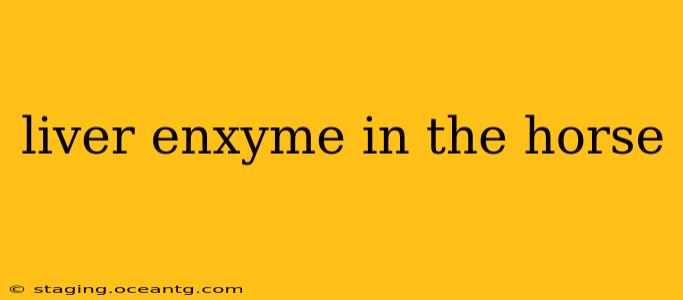Liver enzymes are crucial indicators of liver health in horses, much like in humans. Elevated levels can signal a variety of issues, ranging from mild inflammation to severe liver disease. Understanding these enzymes and their significance is vital for equine owners and veterinarians alike. This guide delves into the key liver enzymes in horses, their functions, and what elevated levels might indicate.
What are Liver Enzymes?
Liver enzymes are proteins produced by the liver that catalyze biochemical reactions within the liver. These enzymes are usually present in the blood in low concentrations. However, when the liver is damaged or diseased, these enzymes leak into the bloodstream, causing a rise in their serum levels. Veterinarians use blood tests to measure these levels, providing valuable insights into the health of the liver.
Key Liver Enzymes in Horses: AST, ALT, and GGT
Several liver enzymes are commonly measured in equine bloodwork. The most frequently used are:
-
Aspartate aminotransferase (AST): Also known as serum glutamic-oxaloacetic transaminase (SGOT), AST is found in high concentrations in the liver, heart, and muscle. Elevated AST levels can indicate damage to any of these organs. In horses, AST elevation is often seen in cases of liver disease, but it's important to consider other potential sources.
-
Alanine aminotransferase (ALT): Also known as serum glutamate-pyruvate transaminase (SGPT), ALT is primarily found in the liver. Therefore, elevated ALT levels are generally a more specific indicator of liver damage than AST. A significant increase in ALT is a strong sign of liver cell injury or necrosis.
-
Gamma-glutamyl transferase (GGT): This enzyme is found in various tissues, but it is particularly concentrated in the liver's bile ducts. Elevated GGT levels often point to cholestasis, a condition where bile flow is obstructed. This obstruction can result from liver disease, gallbladder problems, or blockages in the bile ducts.
What Causes Elevated Liver Enzymes in Horses?
Several factors can lead to elevated liver enzyme levels in horses. These include:
-
Liver disease: This is the most common cause, encompassing a range of conditions such as hepatitis, cirrhosis, and liver failure. The specific cause of liver disease will influence which enzymes are elevated and to what extent.
-
Muscle damage: As AST is present in muscle tissue, strenuous exercise or muscle injury can cause an elevation in AST levels. This elevation would likely be accompanied by other indicators of muscle damage, not just liver enzyme changes.
-
Drug toxicity: Certain medications can cause liver damage and lead to elevated liver enzymes.
-
Infections: Viral or bacterial infections can impact liver function, resulting in increased enzyme levels.
-
Obstructions: Blockages in the bile ducts (cholestasis) caused by gallstones, tumors, or parasites can elevate GGT levels.
How are Elevated Liver Enzymes Diagnosed?
A veterinarian will use a combination of methods to diagnose the underlying cause of elevated liver enzymes. This typically includes:
- Complete blood count (CBC): To rule out other conditions.
- Blood chemistry panel: To assess organ function and identify abnormalities.
- Liver biopsy: This invasive procedure allows for a direct examination of liver tissue.
- Ultrasound: Imaging the liver to detect structural abnormalities.
Can Elevated Liver Enzymes in Horses be Treated?
Treatment depends on the underlying cause of the elevated enzyme levels. Some conditions are reversible with appropriate treatment, while others may require long-term management. The veterinarian will develop a tailored treatment plan based on the diagnosis. This may include supportive care, medication, dietary changes, and addressing any underlying conditions.
What is the Prognosis for Horses with Elevated Liver Enzymes?
The prognosis varies greatly depending on the cause and severity of liver damage. Early diagnosis and appropriate treatment are critical for improving the outcome. Some conditions may resolve completely, while others may lead to chronic liver disease requiring ongoing management.
What are some other questions horse owners ask regarding liver enzyme levels?
How do I know if my horse has liver problems?
Signs of liver disease in horses can be subtle and may include jaundice (yellowing of the skin and eyes), weight loss, lethargy, colic, and changes in urination or defecation. However, many horses with liver problems show no visible symptoms, highlighting the importance of routine bloodwork.
Are there specific breeds of horses more prone to liver problems?
While no specific breed is demonstrably more prone to liver issues than others, certain predisposing factors like genetics or exposure to toxins could make some individuals more susceptible.
What role does diet play in liver health in horses?
A balanced diet plays a crucial role in maintaining liver health. Avoid overfeeding, especially with high-fat or protein diets, which can stress the liver. Proper nutrition supports optimal liver function and aids in the body's natural detoxification processes.
What are the long-term implications of elevated liver enzymes?
The long-term implications of persistently elevated liver enzymes depend on the underlying cause and its severity. If the underlying condition is successfully treated, liver function may return to normal. However, in severe or untreated cases, chronic liver disease can lead to serious complications and potentially a poor prognosis. Therefore, prompt veterinary attention is crucial.
This information is intended for educational purposes only and does not constitute veterinary advice. Always consult with a qualified equine veterinarian for any concerns regarding your horse's health.
